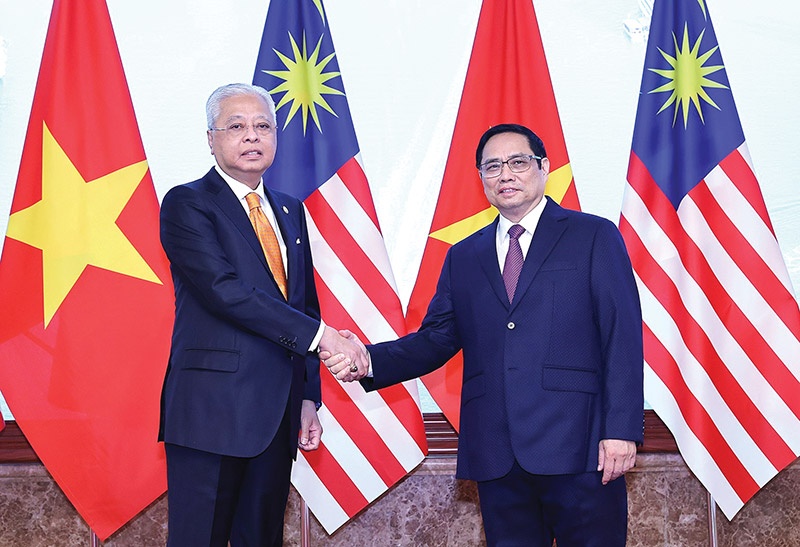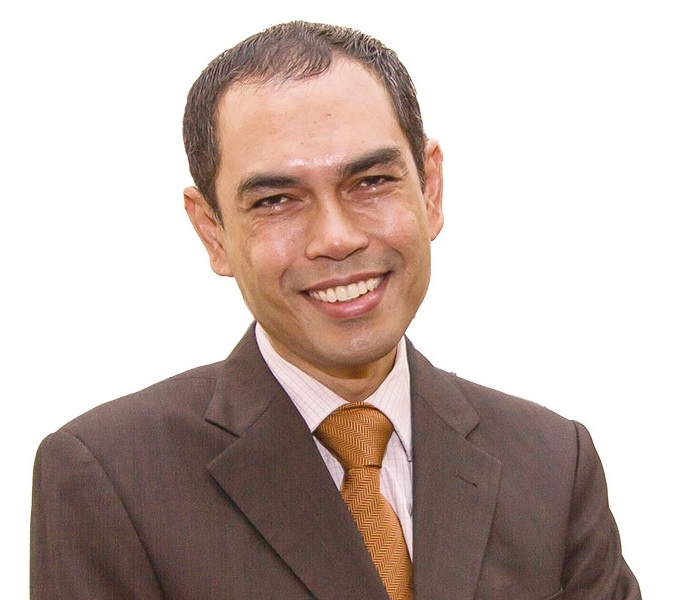Vietnam’s Malaysian ties hit higher gear
 |
| Malaysian PM Ismail Sabri Yaakob (left) met with Vietnamese counterpart Pham Minh Chinh, photo VNA |
During last week’s official visit to Vietnam by Malaysia’s Prime Minister Ismail Sabri Yaakob, both sides agreed to “accelerate negotiations for a new agreement on air services and welcomed the early conclusion of the agreement on mutual recognition of COVID-19 vaccination certificates, which will facilitate the safe and regular commercial travel between both countries,” read a joint press statement between Vietnam and Malaysia released during the visit.
The mutual recognition of vaccination certificates will lead to a milestone in their normalisation of travelling and facilitating investment and trade, especially in the context that Vietnam has been completely opening its doors to international tourists and Malaysia will do the same on April 1.
Both nations have also vowed to provide the best conditions for investment inflows in their respective territories, as this will help them to reach a bilateral trade turnover of $18 billion or higher by 2025, from $16.71 billion last year, up 41.6 per cent on-year.
Last year, Malaysia ranked second in ASEAN and ninth in the world among the trade partners of Vietnam, which in turn was the third-largest trade partner of the former.
Vietnam exports mainly telephones and components, crude oil, rice coffee, and seafood to Malaysia while importing mostly computers, electronic products, machinery, equipment, petrol, household appliances and components, and chemicals. Their trade value was around $2.2 billion in the first two months of 2022, up 20 per cent on-year.
Vietnam and Malaysia have also pledged to beef up trade cooperation in the sectors of agro-forestry-fishery, halal, foodstuffs, electronics. Notably, they will jointly devise a mechanism for exchanging information on trade remedies between the two countries.
Raja Badrulnizam Raja Kamalzaman, director of ASEAN and Oceania at Malaysia External Trade Development Corporation, said that it had set out three agendas in combination with creating favourable conditions for Malaysian businesses to invest and export abroad, in order to enhance trade and especially to raise Malaysia’s exports to the Vietnamese market and to the wider Southeast Asian region.
The agendas focus on developing a sustainable business environment, digitising trade activities, and deploying specific initiatives on the basis of Malaysia’s national trade master plan.
“Both sides agreed to further facilitate the expansion of investment in the two countries, particularly in high potential areas such as automation, smart logistics, innovation, high technology, digital economy, digital transformation,” said the joint press statement. “The leaders also agreed to undertake joint efforts to take advantage of new trade agreements of which the two countries are members to further deepen their trade links.”
According to figures from the Vietnamese Ministry of Planning and Investment, as of February 20, Malaysia ranked third among the ASEAN nations – after Singapore ($65.23 billion) and Thailand ($13 billion) – and 10th among the 140 countries and territories investing in Vietnam, with 668 valid projects worth $12.85 billion.
Meanwhile, Vietnam has 21 valid projects with registered capital totalling $853 million in Malaysia, making the latter the ninth-biggest among the 78 overseas investment destinations of Vietnam.
Over the past years, Vietnam and Malaysia have also been boosting bilateral ties in oil and gas. For example, Malaysian state-owned oil and gas group Petronas is cooperating with PetroVietnam in the exploration, exploitation, and supply of oil and gas services.
The boosted cooperation will help both countries to hit the two-way trade target of $18 billion by 2025. The PetroVietnam-Petronas cooperation began in 1991.
In 2019, Petronas and PetroVietnam inked an agreement for the sale and purchase of additional gas to Vietnam’s Ca Mau gas-power-and fertiliser complex. The agreement refers to a non-binding document that outlines the basic terms of a tentative partnership agreement or transaction.
Under the deal, the complex would receive additional gas of one billion cubic metres per year to solve the gas shortage.
The $2 billion complex includes a PM3-CM gas pipeline, the CM1 and CM2 power plants, the Ca Mau fertiliser plant, and other facilities. The complex was constructed in 2001 in the southern-most province of Ca Mau. Its gas consumption demand is 2.2 billion cu.m per year. The complex uses natural gas resources from Lot PM3-CAA in an offshore area between Vietnam and Malaysia.
PetroVietnam and Petronas would continue to negotiate a gas purchase contract following the signing to ensure the stable and effective operation of the complex as well as the energy security of Vietnam.
According to the Vietnamese Ministry of Foreign Affairs, the official visit by Malaysian PM Yaakob to Vietnam reflected the importance of Malaysia-Vietnam relations as neighbours and partners in ASEAN with the two countries set to celebrate the 50th anniversary of the establishment of diplomatic relations in 2023. Vietnam and Malaysia established diplomatic relations in 1973 and upgraded their ties to a strategic partnership in 2015.
| M. Zamruni Khalid-Former Malaysian Ambassador to Vietnam
Malaysian investors have become major contributors to Vietnam’s economic development, either through providing employment for the Vietnamese people or sharing know-how with local partners. For example, Petronas played an important role in the development of Vietnam’s oil and gas sector. Property and construction-related enterprises, such as Gamuda Land and ParkCity, have contributed to the development of modern townships in major Vietnamese cities. JAKS Resources and Janakuasa are now involved in the construction of thermal power plants. Meanwhile, Tan Chong Holdings, Chin Well Holdings, Malayan Flour Mills, Poh Huat Resources Holdings, Leong Hup, and White Horse are among Malaysian manufacturers with major investments in Vietnam. Malaysian enterprises also ventured into Vietnam’s service sector. These include Berjaya Corporation and Sunway International in hospitality. Additionally, major Malaysian banks such as Hong Leong Bank and Maybank are also operating in Vietnam, either as foreign banks or in joint ventures with local partners. The presence of these banks has indirectly encouraged Malaysian customers to find footholds in Vietnam. Vietnam’s participation in many regional and bilateral trade and investment pacts has also been a pulling factor for Malaysian enterprises to invest in the country, especially from the middle of the last decade. Vietnam’s accession to the World Trade Organization (WTO), which led to a more liberalised market, has opened more sectors for foreign investors’ participation. Furthermore, participation in major regional trade pacts has enhanced Vietnam’s position as an attractive location for investment. In addition to a more liberalised market, Vietnam’s accession to the WTO and participation in many trade pacts, which provide for more streamlined discipline in many areas, have created a more conducive environment for foreign investors, including from Malaysia. |
| During the visit last week to Vietnam by Malaysian Prime Minister Ismail Sabri Yaakob, he and Vietnamese Prime Minister Pham Minh Chinh witnessed the exchange of bilateral documents, including an MoU on legal cooperation activities; and another on the recruitment, employment, and repatriation of workers. Both sides further signed a letter of intent expressing the intention to facilitate work towards the finalisation of an MoU between the Institute of Diplomatic and Foreign Relations of Malaysia and the Diplomatic Academy of Vietnam on Cooperation in the Field of Training Diplomats. Both sides also welcomed the Professional Cooperation Agreement signed between the Malaysian National News Agency and Vietnam News Agency. |
| As of March 17, Vietnam has reached an agreement on mutual recognition of COVID-19 vaccination passports with 17 nations including the United States, the United Kingdom, Japan, Australia, Turkey, Singapore, South Korea, and more. Holders of vaccine passports of these countries and Vietnam are entitled to the same medical requirements as those for local vaccinated people. The recognition includes the exemption of procedures for consular authentication/legalisation when using these papers in the countries of destination.Besides that, Vietnam has so far temporarily recognised the vaccination certificate forms of 79 countries and territories officially introduced by the Ministry of Foreign Affairs. A vaccine passport is a COVID-19 vaccination certificate and/or recovery certificate. The passport is used as proof of a person’s vaccination and recovery history and does not replace other exit and entry papers such as passports, visas, international travel documents, laissez-passers, temporary and permanent residence cards, and visa exemption certificates. A foreign vaccine passport is viewed as valid and can be used directly in Vietnam’s territory if it is officially or temporarily recognised by the Vietnamese government.Source: Ministry of Foreign Affairs |
What the stars mean:
★ Poor ★ ★ Promising ★★★ Good ★★★★ Very good ★★★★★ Exceptional
Related Contents
Latest News
More News
- Hermes joins Long Thanh cargo terminal development (February 04, 2026 | 15:59)
- SCG enhances production and distribution in Vietnam (February 04, 2026 | 08:00)
- UNIVACCO strengthens Asia expansion with Vietnam facility (February 03, 2026 | 08:00)
- Cai Mep Ha Port project wins approval with $1.95bn investment (February 02, 2026 | 16:17)
- Repositioning Vietnam in Asia’s manufacturing race (February 02, 2026 | 16:00)
- Manufacturing growth remains solid in early 2026 (February 02, 2026 | 15:28)
- Navigating venture capital trends across the continent (February 02, 2026 | 14:00)
- Motivations to achieve high growth (February 02, 2026 | 11:00)
- Capacity and regulations among British areas of expertise in IFCs (February 02, 2026 | 09:09)
- Transition underway in German investment across Vietnam (February 02, 2026 | 08:00)


 Tag:
Tag:




















 Mobile Version
Mobile Version